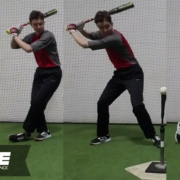4 Tips for Strength Coaches to Connect with Baseball Coaches
The ability to connect with players is a topic getting more and more attention in the sports performance world these days. But, what are some strategies for connecting with the coaches of the athletes you train?
This is a topic I have been thinking about a lot lately, and I figured no better topic to get me back into blogging.
I see a lot of articles on the science involved with being a strength coach, how to be a great programmer, how to teach the squat, top five accessory lifts for baseball players etc.
But, as we all know, being an effective strength coach is more than just the nuts and bolts of a micro-cycle or setting up correctly for a deadlift.
Strength coaches need to be equipped with a certain set of interpersonal skills which allow them to communicate efficiently with the many different personalities they will deal with daily. Athletes are the obvious example that comes to mind, but here I want to focus on the importance of a good relationship between the strength coach and skill coach, and how it can make or break the progress of the athletes involved.
I have seen this relationship from multiple angles in my career, both as both a player and an strength coach. If you’re not careful and collaborative, the dynamic can quickly turn into a coach vs. coach relationship leaving an athlete in a tough spot.
One coach pitted against the other can be escalated to even greater heights thanks to the infinite amount of training information available at your fingertips thanks to YouTube, Instagram, and Twitter, with little guidance on sorting out the good from the bad.
Most coaches develop their ideas and philosophies through personal experiences. Because no two coaches have the exact same background or coaching path, it’s unlikely they’ll see eye-to-eye on every training philosophy; that’s why strength coaches need to be adaptable!
It is naïve to believe there is a one size fits all approach that a strength coach can use to effectively communicate with every sport coach they will encounter.
So how does a coach with knowledge and expertise in getting athletes faster and stronger best communicate with a coach whose main concern is putting together lineups, winning games, and teaching how to throw a change-up?
Check Your Ego at The Door
In coaching, just like any other profession, there are egos involved. Some strength coaches and baseball coaches are slow to change the way they do things, especially if they have had some success. Resistance or hesitation to implement a new training style or program should not be met with resentment by the strength coach.
Instead, the strength coach must be able to communicate the basic tenants of their program to the sport coach. Explaining how the program would benefit the athletes and ultimately improving sport specific performance.
Remember, the sport coaches measure success in wins and losses, not vertical jump height and back squat numbers.
Too often I have seen a strength coach get frustrated and “write off” a coach because they are unwilling to implement fully what the strength coach recommends. Avoid the urge to get upset, and keep being a professional!
Understand where the coach’s reservations are coming from and keep an open mind, perhaps they have some good points based on their experiences that could help you grow as a baseball strength coach.
However, you can communicate to the baseball coach see the “value” in your program, building trust as you develop a relationship. Start by getting small “training” victories and build these small victories on top of one another.
These victories lead to players buying in you, which will hopefully eventually lead to their coach buying in as well as they start to see the results.
Share the Same Goal – Developing Players!
Another thing that is easy for strength coaches to lose sight of is the fact that they are there to elevate the on-field performance of the athletes they work with, through performance training.
Performance training is not the end goal for athletes! This elevation in on-field performance manifests itself in performance!
When I feel I am having trouble communicating or getting through to a coach, I remind myself of this fact, we both want the best for our athletes!
Finding this common ground with a sports coach can create a very strong foundation in which a cohesive work relationship can be built.
Again, patiently describing how you can help the coach and their athletes develop will create value in your training program.
Give a Little to Gain A Lot
Many times, a strength coach must be willing to adapt at times to achieve a greater overall goal.
A quick example of this might be getting on board with a baseball coach taking his team through an basic workout or training session once a week to allow those athletes to come train with you 3 other days that week.
Sure, in your head you know that the players will only have minimal gains in performance by training ince per week, but start building that relationship with both the players and coaches will help develop into a longer relationship.
Trying to be a dictator or a “my way or the highway” strength coach, is a sure way to drive them away from you and your training. This is especially true when you haven’t worked with a sport coach before.
Be Part of the Team
This is a tricky point, one that I feel is vitally important, but can also be easily misunderstood. I have heard strength coaches complain about how they don’t get respect from baseball coaches and sometimes even athletes they work with.
They get hung up on being called “coach”, complain about buy-in, scheduling difficulties, players being on time, the list goes on.
Usually these are the same coaches that don’t ever attend games or practices, rarely to ever show interest in the athletes on-field performance and then wonder why they may be treated differently from other “on-field” coaches.
As a player, I wanted my strength coach to be “all in” on me and the team! It made me feel like he was a part of the team when I would see him at our games.
I think it’s also an important way to show the sport coach that you care as much about team’s success as they do. Showing up at games, practices etc. can go a long way to smooth over any bumps that may be present in a relationship with a sports coach.
It can also begin to help coaches and player see you as an integral part of the staff. Demanding everyone call you “coach” will not earn you anything but a reputation as power hungry egomaniac.
All of this is great, but it must be mentioned here: you are not a sport-specific coach! Know your role and stick to it.
In no way should you involve yourself with any on-field activities/instruction unless explicitly asked to lend a hand.
It is not unusual to see a competent strength coach playing catch with a rehabbing pitcher or maybe helping out shagging balls during batting practice, but again, only do so if you are asked to assist!
Overstepping your bounds is the quickest way to a sport coaches dog house. Stay in your lane!
As the strength and conditioning profession continues to evolve, interpersonal relationships are becoming more and more important.
Yes, the ability to connect with athletes is an integral part of the job, but so is the ability to connect with their other coaches. Understanding and employing the tips above will go a long way in making sure you relate to the coaches in working towards a common goal for your athletes.
Joe Servais
Joe played collegiately at Kansas and Creighton University. He was also drafted by the Colorado Rockies in the 2005 MLB Draft.
Joe is a Certified Strength and Conditioning Specialist (CSCS) with his Master’s in Exercise Science. Prior to starting Servais Sports Performance, Joe has had the privilege in working at the collegiate level as well as in the private sector. He also has experience coaching high school and youth level baseball.
Latest posts by Joe Servais (see all)
- 4 Tips for Strength Coaches to Connect with Baseball Coaches - August 21, 2018










Love the Article… Also love this picture cause i’m in it. SSP FAM
Great article! Even greater picture, because I’m in it. SSP FAM